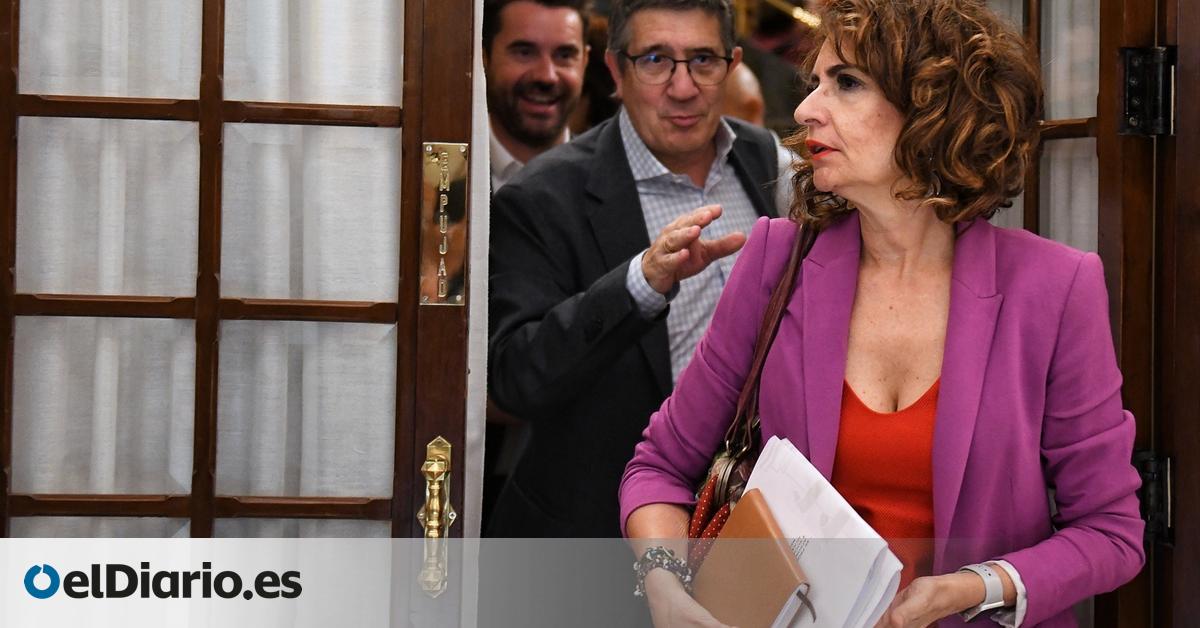
“During this legislature, we have been warning that Junts is not part of any group and our support cannot be taken for granted,” warned Josep Maria Cruset, spokesperson for the Catalan party in the Congress of Deputies. Junts has joined Vox and PP and voted against the Government’s deficit target, putting the 2025 Budget in jeopardy.
Despite the fact that the rest of the parties voted in favour, the Congress finally rejected the Executive’s “fiscal framework” on Tuesday. This is the first misstep in approving the General State Budget (PGE) for next year, after having to extend the 2023 budget this year due to the impossibility of reaching agreements with the investiture partners or with other groups due to the eventful electoral calendar of the last few months (Galicia, Catalonia, Euskadi, European Parliament…).
“You cannot count on the vote of Catalonia in exchange for nothing. We have come to listen to Montero. We have listened to see if there was a change of position, and that in the objectives we were given a tenth more, but there has been no change,” Cruset defended in statements to journalists. Without the support of Junts, and with the votes against from the Popular Party and Vox, the Budgets suffer a first obstacle.
In the debate in Congress, Carlos Martín Urriza, from Sumar, has clarified that the non-approval of “stability objectives” does not prevent the preparation of the new Budgets, but rather condemns them to the previous fiscal path, “which could be a shot in the foot for some,” he said ironically.
According to the spokesperson for Junts, his party requested that in these budgetary stability objectives the Autonomous Communities be provided with a tenth more deficit, so that they would have more capacity and more economic resources. “But there has been absolutely no change,” he said. The issue is that the previous fiscal framework is more restrictive for the Autonomous Communities – explained here – as also recalled by the PSOE in the Plenary Session of Congress this Tuesday.
Previously, the First Vice President and Minister of Finance, María Jesús Montero, had argued that, in the fiscal framework for 2025, “the State is once again assuming a greater effort to reduce the deficit for the benefit of Autonomous Communities and local entities, which will have more room”, according to the information she had already communicated last week. Later, in the press conference in which she took stock, Montero stated that “the stability objectives” rejected by the PP, Vox and Junts made it easier for the Communities not to have to make any effort to reduce the deficit in the coming years. “We will have to continue to dialogue. But the PP is harming its autonomous governments”, she concluded.
This Monday, the central government and the acting ERC Executive agreed on a transfer of 1.52 billion euros over the next three years to continue to comply with the agreement between the PSOE and the Catalan party for Pedro Sánchez’s investiture. A volume of resources that takes a step forward in Rodalies, with the transfer of 1.058 billion, and fulfils the promises regarding university grants and R&D. This agreement represents “a correction in the underfunding” that Catalonia suffers and is “essential, but not sufficient” for Illa’s investiture, said Natàlia Mas, Minister of Economy of the Generalitat.
On the other hand, Cruset criticised this Tuesday that the Government does not understand that it does not have an absolute majority in Congress, and that, therefore, it needs other political groups, in this case the seven votes of Junts, to push forward its initiatives. In fact, the Catalan deputy has disassociated the vote against his party from the objectives of budgetary stability and public debt of the meeting that will take place this Wednesday between the head of the Executive, Pedro Sánchez, and the acting president of the Generalitat, Pere Aragonès, of ERC, to sign the agreement to transfer the management of the Minimum Vital Income (IMV) to Catalonia.
Junts has referred to a “plundering” of 22 billion euros from Catalonia each year. “We have an annual budget that is much smaller than what we would be entitled to based on population or GDP. Since 2015, the State has been constantly failing to comply with Catalonia.”
New deficit path
“They are so angry that Spain is doing well,” the vice-president began, directly against the Popular Party (PP), defending “the objectives of budgetary stability and public debt for the set of Public Administrations and each of their subsectors for the period 2025-2027 and the limit of non-financial expenditure of the State Budget for the year 2025.”
“Their only objective is to overthrow Sánchez. They don’t care about VAT on food, or families’ pockets…,” he criticised. “As you know, Spain will continue to lead growth among the main economies in the Eurozone,” he stressed. “The data show, although some want to deny it, the structural transformation,” he added.
The Executive proposed to maintain the limit on non-financial spending (including European funds) at 199,171 million for 2025, in line with the 2024 ceiling, to comply with the requirements of the fiscal rules of the European Union (EU) that have been activated this year and because now there will be fewer transfers from the Recovery Plan and more ‘cheap’ loans (neither interest payments nor pensions are contemplated in the spending limit).
The new deficit path (the imbalance between state income and expenditure in relation to GDP) sought to reach 2.5% next year, 2.1% in 2026 and 1.8% in 2027. “We have reduced the public deficit by 60 billion since 2020, to 3.6% in 2023, below other countries such as France or Italy, despite having deployed a social shield of more than 120 billion [desde 2020]with measures that remain in force,” Montero argues.
The forecast for 2024 is to leave it at 3% (always in relation to GDP), which allowed Spain to avoid the excessive deficit process foreseen by the new EU rules. This “process” would involve an intervention by the European Commission in national budgets to guarantee “the sustainability of public accounts”.
Economic growth will allow public debt to be reduced to GDP below 100% in 2027, according to the same estimate, “recovering all fiscal space” during the pandemic, in which the Government had to make a historic effort in public spending to mitigate the damage caused by the COVID shock.
Medium-term fiscal plan in autumn
“The deficit can be reduced without cuts,” stressed the First Vice-President. In September, the Executive has to send a medium-term fiscal plan to Brussels (here AIReF recommendations are analysed), which will be marked by the deficit path and by a GDP growth horizon above 2% in the coming years and job creation, which is what allows spending to be maintained and the deficit to be reduced.
“We are interacting with the Commission to determine the final proposal on net primary expenditure, which is the most important variable of the new EU fiscal rules,” the Minister of Finance has warned.
The new spending ceiling is “prudent” according to the new framework of fiscal rules. The revenues that feed the Budget will grow by 5.4%, and in total by 6.5%, according to the same exercise of projections by the Executive, a slower pace than in recent years.
“This Government has made it possible to reduce the deficit and the public debt ratio by strengthening the welfare state,” Montero insisted, in contrast to the austerity model that was applied after the financial crisis of 2008.
In the debate in Congress, the Popular Party (PP) has used the AIReF report, which calls for an “adjustment” of 6 billion euros per year to comply with the new fiscal rules of the EU. The Independent Authority for Fiscal Responsibility calculates that an “annual adjustment” of 0.43% of GDP until 2031 of the “primary expenditure” of the Administrations is necessary to achieve the sustainability of public accounts according to the European framework that will begin to operate in 2025.
Source: www.eldiario.es

